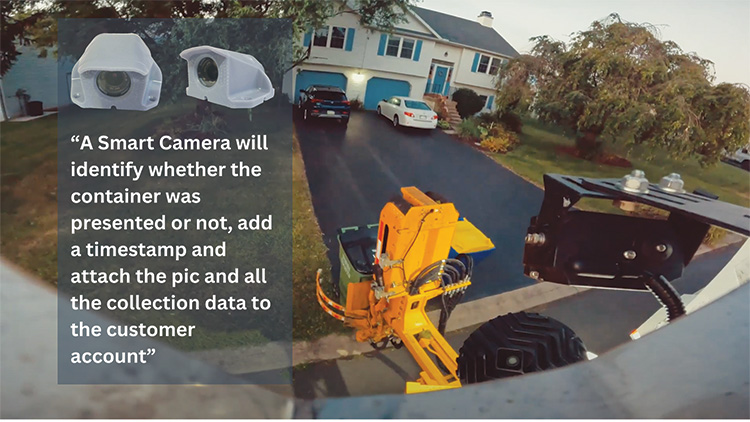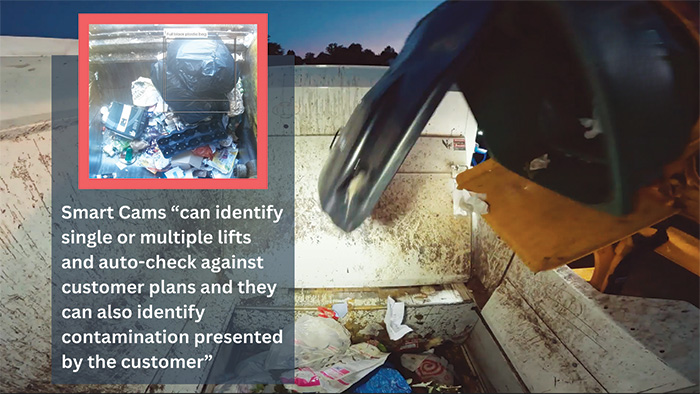Take a step back to understand the different types of camera systems available and the difference in the solutions they provide. Know exactly what you are getting, what to expect, and how your business will benefit.
By Vlad Zavgoro
In the January edition of Waste Advantage Magazine (“Routing Out’ the Problem of Service Verification”), we gave an overview on the various verification solutions that are available to waste haulers. One of the topics we covered was camera verification and the solutions that they provide. We showed how cameras offer more to haulers when it comes to proof of service. As a result of that article, we received a lot of great questions from haulers that were seeking clarification between these new smart cameras and other camera systems that are used on trucks to monitor road behavior. So let us look at the different camera systems that are available and the difference between the solutions they deliver.
Different Camera Systems
When we speak to haulers, the way that we best differentiate the camera systems that are available is to split them into two key categories:
1) Operational cameras (passive systems)
2) Smart cameras (intelligent systems)
Both camera systems might look similar, but they could not be more different in what they do.

Operational Cameras (Passive Systems)
This category of camera has been on the market for awhile and most people will be extremely familiar with them. In fact, it is very likely that you also have such cameras on your own personal vehicles. These cams are like dash-cams, but with a lot more added features. They record road behavior and performance. Many trucks will have multiple cameras on both the interior and exterior of a truck so that it is recording not only what is happening on route, but also what is happening in-cabin. These cameras are fantastic for many reasons, including visibility of driver behavior and video evidence of incidents. One of the key goals of waste haulers is to reduce incidents, and these camera systems offer so many benefits in this area. Through the reduction of incidents, your safety record improves and these, in turn, increase staff retention and reduce costs in areas such as legal and insurance.
Smart Cameras (Intelligent Systems)
The reason that we call this category smart cameras (intelligent systems) is that they go beyond recording a behavior. A smart camera records like any camera, but the difference is what it does with what is recorded. Take the area of service verification as a great example. An operational camera on your truck can be set up to record what the truck sees as it drives its route. As such, it will capture whether a container was presented or not presented for collection. However, then a person has to watch the footage to verify if the container was presented or not. That is how operational cameras (passive systems) work.
New smart cameras will not only capture the footage, but it will also do all the extra costly human work. A smart camera will identify whether the container was presented or not, add a timestamp and attach the pic and all the collection data to the customer account. It does all of this automatically so that you do not have to wait to talk to a driver to find out what happened. It is not just about verification. For example, smart cameras can identify single or multiple lifts and auto-check against customer plans, and they can also identify contamination presented by the customer. This is a great example of how technology is delivering more automation to the waste industry and there is no doubt that smart cameras will offer more and more functionality as the technology develops. In a nutshell, smart cameras will give you more reliability and dependability for daily tasks while also saving money on labor and dispute resolution.

What to Expect
It is easy to see why there could be confusion when looking at getting a camera system for your business. Our recommendation is that you start by taking a step back to understand the different types of camera systems available and the difference in the solutions they provide. By splitting them into two categories (operations cameras and smart cameras), you will know exactly what you are getting, what to expect, and how your business will benefit. | WA
Vlad Zavgoro has worked at WIS for 10 years, starting as a software developer where he focused mainly on their suite of truck apps and routing. For the last three years as WIS’ Product Director, he has led the routing product team and has worked with waste companies around the world, developing solutions that greatly improve service verification and much more. Vlad can be reached at [email protected]. For more information, visit www.wiswm.com.
